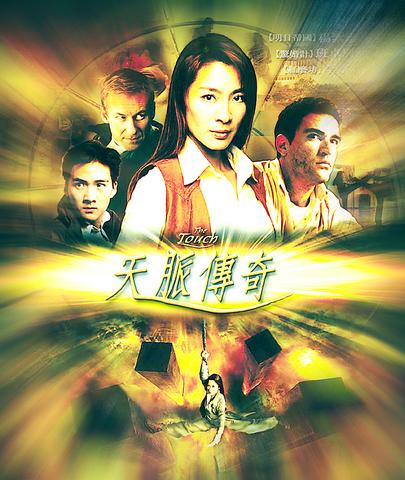For an Asian film trying to cross over into the international market, The Touch (天脈傳奇) has all the elements to make it work. It has as its heroine Michelle Yeoh (
The Touch has an ambitious goal and a brilliant start. The opening scene of a circus show in which Yeoh leads the acrobats is fascinating, which, as Yeoh said herself, blends influences of both East and West. Behind the cameras, this is Yeoh and her business partner, Thomas Chung's (鍾再思) first production together, costing US$20 million (even higher than Crouching Tiger), and it has Miramax taking care of US market distribution.

PHOTO COURTESY OF BUENA VISTA
However, as one follows the story, it is not difficult to become disappointed. To become an Oriental version of Indiana Jones or The Mummy, The Touch needs to pay a little bit more attention to its audience. Yeoh, as Yin, the elder daughter of a family of acrobats, is the center of the film and also its most complete character. Her family has been charged for centuries with protecting the Sharira, a relic purported to contain the pure essence of a Buddhist holy man. Generations of the family have passed on the martial art skills necessary to retreive the Sharira from its hiding place when the time comes.
Eric (Chaplin) plays an American who is Yin's former lover. He walks a fine line between good and evil. He's a professional thief of treasures -- especially for those acquired unjustly -- and one day he shows up again at Yin's with a medallion, the Heart of Dunhuang. The Heart is her family's treasure and is a key to unlocking the legend of Sharira. Eric's old employer, Karl, an unscrupulous rich man who covets valuable Oriental treasures, is eager to get the Heart for himself. Together, they travel through desserts, lakes and mountains to retreive it from the holy land that has long been its resting place. Facing the expedition team are a dangerous natural environment and deadly traps designed to kill any invader of the holy land, be they good or evil.
Peter Pau's cinematography is flawless and he presents the scenery like a soulful painting. Chaplin has an apt performance playing a naughty, but good-intentioned thief who steals Yeoh's heart.
But these cannot cover the major flaw of the film: the not-so-fascinating legend. Through out the film the legend is never explained well. The profoundness of the Sharira and its powers are kept mysterious. There is good action and spectacular visual effects when the characters step into the holy land full of traps. Pity that the scene is too short-lived. What follows is a sequence of unconvincing action scenes designed only to maintain the film's pace, including Yeoh's jump from a cave up dozens of meters to the edge of a cliff -- a shot obviously computer-generated, which ruins the atmosphere Pau and Yeoh worked to develop in the first half of the movie.

On April 26, The Lancet published a letter from two doctors at Taichung-based China Medical University Hospital (CMUH) warning that “Taiwan’s Health Care System is on the Brink of Collapse.” The authors said that “Years of policy inaction and mismanagement of resources have led to the National Health Insurance system operating under unsustainable conditions.” The pushback was immediate. Errors in the paper were quickly identified and publicized, to discredit the authors (the hospital apologized). CNA reported that CMUH said the letter described Taiwan in 2021 as having 62 nurses per 10,000 people, when the correct number was 78 nurses per 10,000

As we live longer, our risk of cognitive impairment is increasing. How can we delay the onset of symptoms? Do we have to give up every indulgence or can small changes make a difference? We asked neurologists for tips on how to keep our brains healthy for life. TAKE CARE OF YOUR HEALTH “All of the sensible things that apply to bodily health apply to brain health,” says Suzanne O’Sullivan, a consultant in neurology at the National Hospital for Neurology and Neurosurgery in London, and the author of The Age of Diagnosis. “When you’re 20, you can get away with absolute

May 5 to May 11 What started out as friction between Taiwanese students at Taichung First High School and a Japanese head cook escalated dramatically over the first two weeks of May 1927. It began on April 30 when the cook’s wife knew that lotus starch used in that night’s dinner had rat feces in it, but failed to inform staff until the meal was already prepared. The students believed that her silence was intentional, and filed a complaint. The school’s Japanese administrators sided with the cook’s family, dismissing the students as troublemakers and clamping down on their freedoms — with

As Donald Trump’s executive order in March led to the shuttering of Voice of America (VOA) — the global broadcaster whose roots date back to the fight against Nazi propaganda — he quickly attracted support from figures not used to aligning themselves with any US administration. Trump had ordered the US Agency for Global Media, the federal agency that funds VOA and other groups promoting independent journalism overseas, to be “eliminated to the maximum extent consistent with applicable law.” The decision suddenly halted programming in 49 languages to more than 425 million people. In Moscow, Margarita Simonyan, the hardline editor-in-chief of the